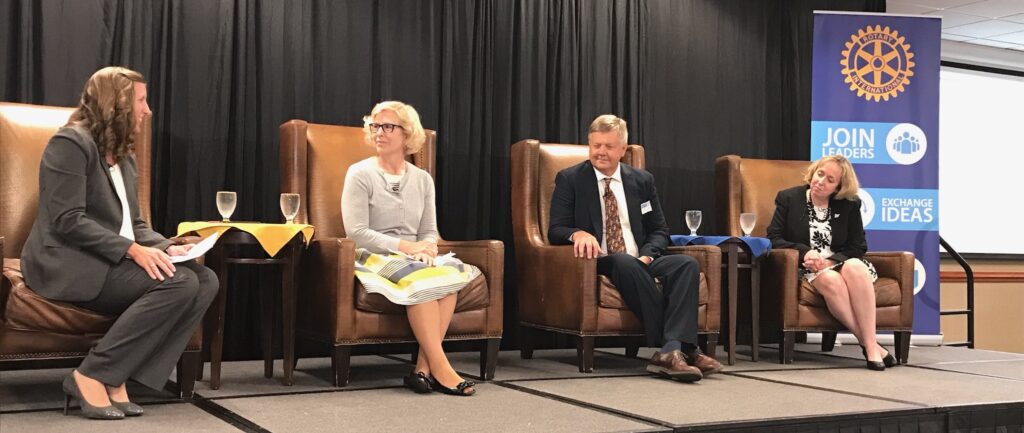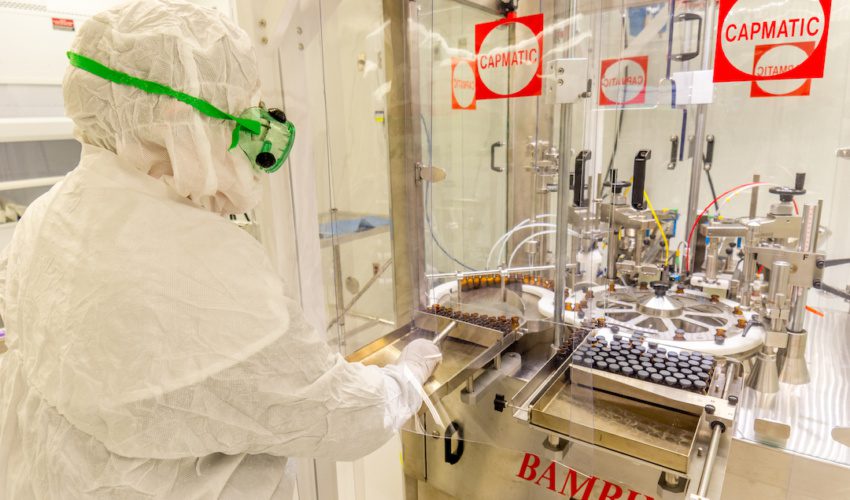How cancer advancements benefit you and your loved ones
Aug. 15, 2022
This paid piece is sponsored by Avera Health.
If you were born before 1970, you not only remember bell bottoms and wall telephones, you remember when a cancer diagnosis was too often a “terminal” diagnosis.
“Cancer is no longer a death sentence,” said Kris Gaster, Avera assistant vice president of oncology strategic initiatives. “There are 20 million cancer survivors living today.”
The reason can be summed up in one word: research.
“As a cancer doctor or nurse, you want to be able to provide hope, and that’s what’s changed with the advancements in cancer care,” said Gaster, who began her 40-year career as a nurse in the McKennan Hospital oncology unit.
Most recently, advancements centering around immunotherapy and targeted therapy are making the difference, said John Lee, chief medical officer for Avera Cancer Institute Research.
Lindsey Meyers, vice president of public relations at Avera, leads a panel discussion at a recent meeting of the Rotary Club of Downtown Sioux Falls with Kris Gaster, Dr. John Lee and Pam Traxel, senior vice president for the American Cancer Society Cancer Action Network.
Fighting cancer at the cellular level
Bone marrow transplant, also known as stem-cell transplant, paved the way for new cellular therapies. Avera is still home to the region’s only blood and marrow transplant program, in place since 1996.
“Bone marrow transplant in the treatment of diseases like leukemia and lymphoma completely wipes out your bone marrow, which manufactures immune cells. Before the transplant, the person’s immune system couldn’t recognize the tumor as an invader. But after the transplant, the rebuilt immune system could recognize the cancer cells, fight them and kill them,” Lee explained. “So through that work, we knew how the immune cell recognizes cancer and can go in and be a killer.”
Recent cellular therapies build upon that insight. Examples include natural killer, or NK, cells; chimeric antigen receptor T cell, or CAR-T; and tumor-infiltrating lymphocytes, or TIL. Through these therapies, patients receive immune cells that are genetically altered and engineered to specifically fight that person’s individual case of cancer.
“In some patients and with some cancers, we’re seeing amazing responses. Like going from a complete cure rate of 5 percent to 80 percent. These are amazing opportunities, and they will only become more and more advanced and effective through cancer research,” Lee said.
Greater access to cancer clinical trials
Another change for people in the Upper Midwest is access to leading-edge research trials.
“It used to be you didn’t have access to the best clinical trials if you weren’t near a national cancer center,” Lee said.
“Now, we offer the best-in-class clinical trials across the structure of our entire system, bringing in trials like CAR-T and targeted therapy with minimal travel.”
Avera Cancer Institute has 120 clinical studies open, with 11 percent of patients participating in a study over the past year.
“Our goal is to increase that percentage, but that’s always determined by the patient’s decisions and their partnership with their cancer care team,” Lee said.
First and foremost, patients get evidence-based standard treatment for their type of cancer.
“Then, if there is a study that’s appropriate for their type of cancer and they want to participate, we have the structure in place to facilitate their participation. It’s evidence-based clinical care, plus,” Lee said.
Avera is expanding clinical trials through cancer centers in Pierre, Yankton, Aberdeen and Mitchell, and in Marshall, Minnesota, to address that issue.
“You’ve got to be creative and think outside the box. We may not be able to send a whole research staff in person to all locations, but we can do it virtually,” Lee said.
Precision oncology
In other research that builds upon its existing precision oncology program, Avera recently announced the Avera/Sema4 Oncology and Analytics Protocol study.
The ASAP study, which started with a soft launch in November 2021, will enroll up to 3,000 patients a year for five years, including those with cancer and those at risk for developing cancer.
Study participants will receive genomic sequencing of their tumor, as well as hereditary and pharmacogenomics testing to identify targeted, personalized treatment options. Sema4 and Avera will then utilize this clinical and genomic data to improve the understanding of the molecular characteristics in all stages of cancer patients to advance precision oncology treatment.
Avera’s physicians and patients will benefit from data-driven insights that inform targeted treatments.
Care for the whole person
Personalized cancer care means treating the whole person. “One novel way that we’re doing this at Avera is through our 24-hour Cancer Navigation Center,” Gaster said.
The Navigation Center takes calls around the clock from any cancer patient.
But if you are an Avera patient or a family member, the Navigation Center staff can look into your medical record and provide treatment protocols for symptoms or side-effects that are pre-approved by physicians, perhaps saving a middle-of-the-night trip to the emergency department.
“That blanket of security is so important to people going through cancer treatment,” Gaster said.
Learn more at Avera.org/Cancer.








